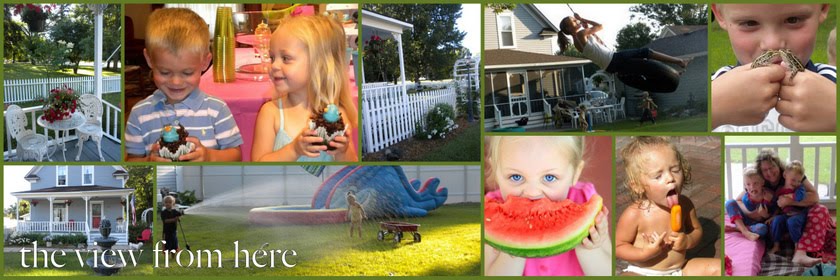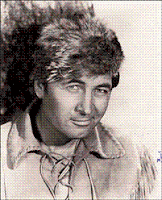
What makes a great dad? And how do you know if a man will make a good father before you marry him? In many ways, a mother is made at birth--both she and the child know their relationship is what keeps a baby alive. But I believe it takes a lifetime to make, and appreciate, a father.
I first met Ron when he was a junior in high school. We started dating that year and, though he was quiet and shy, I took note of how he treated others. He was respectful of his mother and sisters. He was kind to his little brother and brought him along on many of our dates. He was a student aid on the playground for elementary children and they loved him. He was sweet to his little nieces and nephews and talked about them with fondness. But the first baby he ever held was ours: Kimberly was born almost one year to the day of our first wedding

anniversary. Ron became a daddy just before his 22nd birthday.
I remember how awkward we both were with Kimmie, but it was especially noticeable on Ron. His great big, farmer boy mitts were clumsy with all the flannel trappings of a newborn. He looked at me with tear-filled eyes. I think we were both wondering the same thing.
"What have we gotten ourselves into?"Somehow, our daughter survived and, less than two years later, we had our second child,
Amy. Things were less complicated now that we knew how to put diapers on frontwards and didn't feel so compelled to lay awake nights making sure this baby kept breathing. These were very busy years for a young man of 23 who still didn't know what he wanted to be when he grew up, who had to work hard to get along with his tired, hormonal wife and keep his growing family fed and clothed.
Over the next five years we moved five times between three states and Ron c

hanged jobs about as often. He took Bible classes in Florida. He did some dairy farming, a little carpentry, worked as a youth pastor at our church. He started his own business. We added two more children after that; our son Michael, and daughter Stephanie. Ron developed a reputation for being the parent you didn't want to mess with and frequently got to fulfill the dreaded promise,
"Wait until your father gets home!" That must have been fun for him---to come home tired from a long day at work and see who needed a spanking! But he supported his wife 100% and if she said the little cherub sitting on the steps polishing his halo needed to be punished for some earlier misdeed--he believed her and delivered what was necessary. The kids learned early on that mom and dad worked as a team and could not be easily divided.
It was al

so Dad who taught the kids to work. He showed them how a toilet should be cleaned and posted handwritten, step-by-step instructions inside the bathroom cabinet for them to refer to. There was a right way and a wrong way to load the dishwasher so as to get as many dishes in each load as possible. He didn't allow lengthy showers that wasted water or lights to be left on when no one was in the room. If he said "
Be home by midnight," and you weren't--heaven help you deal with the boredom of being "
grounded for a week," his standard length of confinement for missed curfew. One of our teenagers commented on his icicly direct eye-contact when he was angry telling him, "
You have such evil blue eyes!"Ron commanded respect and had no tolerance for a "smart mouth" toward himself but especially directed at his wife. He taught the children to respect their mother and to thank her for every meal and clear away their own dishes. He showed his son how a man should treat his wife and his daughters how they should expect to be treated by their future husbands.
He played with his kids. There were endless games of cards, chess, and CandyLand and the watching of countless Disney movies. He willingly took part in their Make Believe and became everything

from the Big Bad Wolf to Joseph, husband of Mary. He sat passively and allowed his hair to be fixed in barettes and curlers. But the kids' favorite games were the ones he made up: "Airplane"--where he would lie on the floor on his back with his feet in the air and take turns "flying" them around on his feet while he held their hands. He also played The Tickle Game where "
Stop means go and go means stop" and everything they said meant "
tickle me more." There was always lots of screaming and laughing and he usually did this at bedtime to get them all nice and riled up.
The m

ore children we had, the more Ron warmed to his role. I have always told people he is, and has always been, the kinder parent. It was Daddy who got up with a sick child during the night. They always went to his side of the bed and woke him first. He'd change the sheets on their beds without complaint, clean up the puke or pee, get them into new jammies. Even when I had a nursing baby, Ron would hear the crying first and bring me a freshly diapered baby who was ready to eat--allowing me to get enough rest for a shift that lasted all the next day.
Our last child, Victoria, was born when we had two teenagers in the house and both of us were perched on the edge of 40. We were more tired than we had been with our first four children with all the sports and music and work schedules of so many children to keep up with. We told everyone, "
Tori is our practice grandchild." She slept in our bed until she was six. She doesn't remember being spanked. She hasn't got a clue how to clean a toilet much less replace the paper on the holder. We have enjoyed her completely and her daddy is tightly wrapped around her little finger.
Through the last nearly 30 years of parenting, it has been Ron's special privilege t

o tuck the kids in and pray with them at bedtime. As they've gotten older, he never tires of involved discussions with them on baptism and divine election or philosophies of life, work, politics, and relationships. He has demonstrated to our children how important it is to know God and to yield to his control in their lives. Our grown children call him when they need advice about work, remodeling, conflicts with professors, funny sounds the cars are making, or doing their taxes. They know their father's love language is to serve them and he does it with joy.
Ro

n has upheld tradition in our family. The kids know that they go out with Dad for breakfast on their birthdays. They get to pick the restaurant and order whatever they want off the menu and even the adult kids love this time with him. Both of our married daughters chose husbands with many similarities to their dad. Both men asked for Ron's blessing prior to proposing to his daughters and he was greatly honored--thinking this was a dead tradition. It was an extremely emotional moment for him to walk each of his daughters down the aisle at their weddings and he struggled throughout for control. If you think
I am a sentimental person, you have never truly known my husband.
Ron has survived two decades of teenagers and the malignment and lack of

appreciation and sleep that goes along with those days. Now he is enjoying the sweet reward of seeing his children parent. "Bumpa" loves Cohen, Sawyer, and Paisley completely. He is the first to scoop them up when they come to visit and he loves to take them for rides around the yard on the lawn mower. I look at this man with the thinning gray hair and remember a headful of unruly blond curls. His sky blue eyes have not lost their sparkle but have mellowed and require glasses to read small print. His hands are softer, instead of calloused and bandaged from hard physical labor, and he uses them to confidently embrace his grandchildren. How did I ever get so blessed? How could I have ever known, at 18, what I was getting when I said "
I do," to this man?
Happy Father's Day, Sweet Heart of My Heart! This holiday was made for you. The world would be a better place if there were more men like you...

























